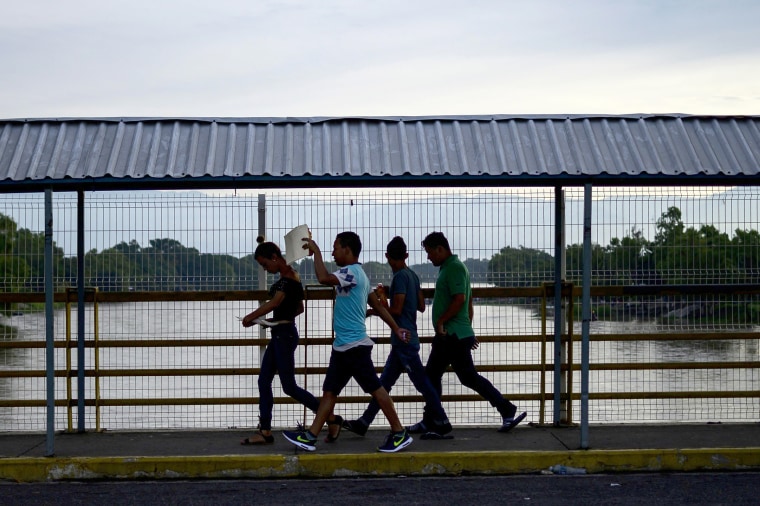MEXICO CITY — Mexico and the United States might consider additional steps next month to restrict migration from Central America, including measures to bind Brazil and Panama into their efforts, Mexico's foreign minister said on Monday.
Foreign Minister Marcelo Ebrard said the measures could be needed if a deal announced last week between Washington and Mexico fails to reduce within 45 days the numbers of migrants entering Mexico, mainly from Central America, on their way to the U.S. border.
The deal averted import tariffs on all Mexican goods that President Donald Trump had threatened to impose unless Mexico committed to do more to fight illegal immigration into the United States.
Stock markets around the world rose on Monday while U.S. Treasury prices fell after the United States shelved the tariff plan, easing worries about the impact of another trade war on the global economy. The Mexican peso was up more than 2% against the dollar but major risks remain for the currency.
Under the agreement, Mexico will rapidly expand a program under which migrants applying for asylum in the United States wait out the process in Mexico. It has also pledged to reinforce its southern border with Guatemala with 6,000 members of its National Guard militarized police force.
But Trump on Monday said he would go ahead with the proposed tariffs if Mexico's Congress does not back part of the deal that may need lawmakers' approval.
"We do not anticipate a problem with the vote but, if for any reason the approval is not forthcoming, tariffs will be reinstated," he wrote on Twitter.
Ebrard said Trump was referring to possible further measures to pressure countries other than the United States to share the burden.
Brazil, Panama, Guatemala
"If the measures we are proposing are not successful, we have to discuss with the United States and with other countries, like Guatemala, Panama and Brazil," he said. "It is a regional system."
"If we have to participate in a regional model like the one I have just described, we would have to present that to Congress," Ebrard said.
Many of the migrants are families trying to escape poverty and violent crime in Central America, one of the most impoverished areas in the Western Hemisphere.
Asylum seekers from El Salvador and Honduras first pass through Guatemala when fleeing their homes, while Cubans and Haitians often fly first to Panama before heading to the United States through Mexico. Migrants from African countries regularly fly to Brazil before making the arduous journey north.
While he did not go into detail, Ebrard suggested that asylum seekers might have to seek refuge in the first country they reached after leaving their homeland.
That is different from a long-standing U.S. demand that Mexico be declared a safe place for asylum seekers, requiring them to seek refuge in Mexico if they passed through the country on the way to the United States. That demand was put on the table again by U.S. negotiators last week, but was not accepted by Mexico.
Any plan that called on Brazil, Guatemala or Panama to take in more asylum seekers would require cooperation from those countries.
U.S. border officers apprehended more than 132,000 people crossing from Mexico in May, the highest monthly level since 2006. Trump, who has called the surge in migrants an "invasion," had threatened to keep raising duties up to 25% unless Mexico did more to curb it.
The Trump administration announced on Monday that Kenneth Cuccinelli will serve as the new acting director of U.S. Citizenship and Immigration Services, which oversees the nation's legal immigration system. Cuccinelli, a former attorney general of Virginia, has developed a reputation as a hardliner on immigration.
He has called for denying citizenship to U.S.-born children whose parents are in the country illegally, and authorized law enforcement officials to investigate the immigration status of anyone they stopped.
Mexico had no specific target for the reduction of migrant numbers, Ebrard said. Still, Martha Barcena, Mexico's ambassador to Washington, told CBS News at the weekend there had been discussion of reducing the numbers to levels of around 2018.
Ebrard also said there was no agreement between the United States and Mexico to purchase more agricultural products under the accord, despite Trump saying at the weekend that Mexico had agreed to buy "large quantities" from U.S. farmers.
Ebrard said he thought Trump might be making a calculation based on Mexican agricultural imports when freed from the threat of tariffs.


